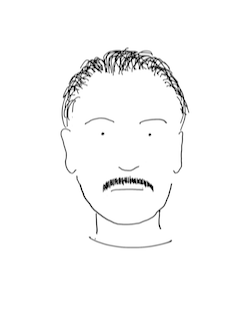Over the years I have come to the realisation that, despite his claims to the counter, much of Adam’s work – for Wake but also in a much broader sense – embodies the ideas that Pete and other contributors have espoused at this week’s festival.
In the introduction to the Street Art tour Adam describes the context into which it is placed. Historically, in Northern Ireland, the use of paint on the walls of buildings has been used extensively and almost exclusively to mark out territory. Great murals in honour of fallen heroes or support for the ‘struggle’ adorn the gable-ends of the terraced housing. There is nothing especially wrong in doing this and the practice is widespread across both loyalist and republican communities. However, what of the people that feel no great affinity to either? How do you convey a lack of identity in a place where it has defined, distorted and controlled every aspect of daily life for decades? Adam spoke of (re)claiming neutral space in the city on behalf of these people – the many thousands that didn’t want to identify with either side of the sectarian divide. In support of this Adam set up the ‘Hit the North’ festival during which artists are invited from all over the world to come to Belfast and paint a piece on one of the walls.
As well as the walls Adam also organised the first Culture Night which does a similar job for the streets.
At last weeks Wake Festival we listened to a lot of contributors referring to the Lacanian concept of ‘lack’. It occurred to me that this ‘gap’ within us, a space that we try to fill with ideas of who we are and what might fulfil us and make us whole (again), can be compared in some way to the communal space that Adam is trying to retain and maintain.
I spent last week in loyalist East Belfast and it is very clear that the people there have attempted to fill all their public spaces with markers of their passionately held identity. There is literally no room for other ideas of identity to be placed. Similarly, if I successfully fill my void – the lack at the core of my being – with ideas of who I am and how the world is and/or should be then I, too, have no room to accommodate other concepts of who I might become or how the world could be. I close down possibilities with my certainties. I have no time for those that disagree with me – be that friend, neighbour or foe. In short, I reject and exclude the ‘other’.
So what? We have our tribe, they have theirs etc. On some level I fully appreciate and actively engage with this point of view – it’s very comforting and feels very natural. Ever was it thus?… Well no I don’t think it was, I don’t see there is, necessarily, anything that pits people against one another. It’s not natural, inevitable or unavoidable. We defer to identifiable traits of human nature far too casually in general and far too easily in our selves. We think we are a ‘type’ and we gravitate towards others with whom we perceive certain shared affinities. The rest, we scapegoat and we belittle and we thank our lucky stars that ‘we’ are not ‘them’.
We are broken but we can fix this.
In order to do so we must tackle the problem on two levels. At a personal level we need to practice experiencing the world as it is. I do the Sam Harris Waking Up meditation programme that is very much built around this idea. Through the sessions you focus your attention on sights, sounds and feelings that appear to your consciousness. This permits the possibility of the total removal of the self from any given situation which then creates the necessary space for a real encounter with the other and, moreover, the world as it is not as we choose to filter it. On the second level – in a communal sense – we must emulate the work of practitioners such as Adam in creating and curating neutral spaces by being with and caring for each other.
Sounds straightforward because it is. I experienced it firsthand at Wake last week with 40 – 50 people from many different backgrounds and situations.
It’s not easy but it is worth the effort. To paraphrase Dylan, I’ll let you be in my gap if I can be in yours.

